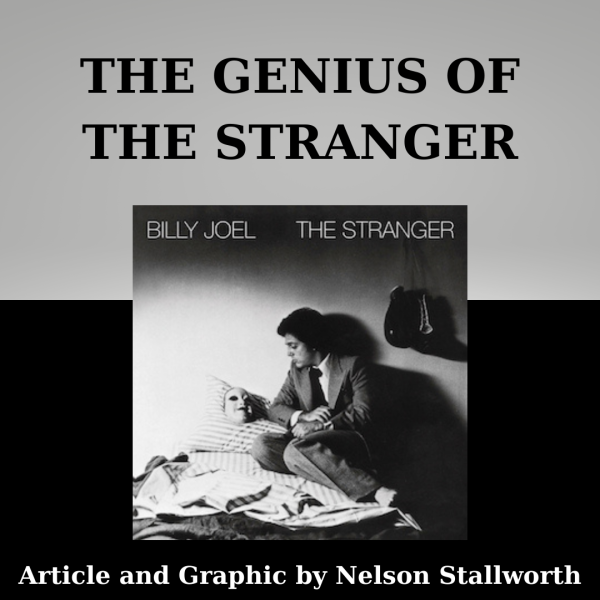For many, art—music especially—is an escape to worlds unknown, a method by which one can forget his troubles and float away from reality in a sea of rhythms and harmonies. For others, music is nothing more than something to fill silence with. For others still, music is a source of inspiration, boosting motivation and fueling creativity. For Billy Joel, music was an outlet, a mode of expression of all the quiet victories and unnoticed defeats of 1970s American life. Nowhere in his expansive discography is this more evident than in his 1977 magnum opus, The Stranger.
The year was 1976 and Joel’s career was in danger. His fourth studio effort, Turnstiles, had flopped miserably in comparison to the much more beloved Piano Man, and Columbia Records, the label he was signed to, was on the verge of dropping him. On top of that, he was a recent divorcee and facing significant financial problems. In other words, he needed a hit. Determined to deliver, Joel turned to Phil Ramone, a famed music producer with an illustrious catalog of collaborations. Together with Ramone and Joel’s touring band (formed during the production of Turnstiles), Billy Joel succeeded in creating a seminal work of art that would transcend his career and earn a permanent place in the pantheon of classics.
The Stranger’s runtime adds up to just over 42 minutes across nine stellar songs. It opens with the pop-rock tune “Movin’ Out (Anthony’s Song)”, a working-class anthem lamenting the struggles faced by many in pursuit of financial freedom and the American dream, followed by the traditional rock title track that explores our inevitable tendency to hide parts of ourselves from others. The third track, “Just the Way You Are,” is a smooth, romantic ballad that captures perfectly the sentiment of enduring love and acceptance. The song’s timeless quality has made it one of Joel’s most popular. Following is what is widely considered the album’s centerpiece, the 7-minute “Scenes From an Italian Restaurant,” a multi sectioned epic that tells the incredibly ordinary story of Brenda and Eddie, two high school sweethearts who marry young and, due to financial troubles, quickly divorce. “Vienna” is a somber song urging its listeners to take a more patient, thoughtful approach to life, freeing themselves of the overwhelming burdens of the world. “Only the Good Die Young” was at the time controversial, as it portrays a young man’s failed attempts to seduce a Catholic woman. “She’s Always a Woman” is a mature ballad that picks up where “Just the Way You Are” left off. The album closes with “Get it Right the First Time,” a simple song in which Joel worries over impressing a girl, and “Everybody Has a Dream,” a gospel-influenced song about Joel’s hopes for a happy life with his then-wife.
For such a celebrated project, The Stranger is not an album of grandiosity, nor is it in any way imposing. In all facets, it’s a humble expression of resignation to life and its inherent imperfections. The songs are laden with themes of failure, whether in the form of failed relationships, unmet ambitions, or the unavoidable disappointments of life. However, it’s in this uncompromising realism that The Stranger finds the reason for its enduring popularity: It’s endlessly relatable. At its core, it perfectly captures the universality of life’s struggles. It urges listeners to embrace their flaws, to love others in their entirety, imperfections and all, and to recognize that we all, subconsciously or otherwise, spend our lives chasing dreams, a strenuous journey on which we will fail time and time again. The Stranger commands that we acknowledge, accept, and appreciate that fact. Each track encapsulates the profoundly ordinary—and the ordinarily profound—aspects of life, giving it a timeless quality, accessible to all.
In its unapologetic portrayal of life, The Stranger never seeks to sugarcoat life’s valleys, nor does it ever intend to darken its peaks. Rather, both are displayed in all their beauty. Songs like “Just the Way You Are” celebrate unconditional love right before “Scenes From an Italian Restaurant” laments the fate of a couple that “didn’t count on the tears.” “Everybody Has a Dream,” the album’s closer in which Joel croons about his hopes for a future with his then-wife, comes only a few songs after “Vienna” warns us to “dream on, but don’t imagine they’ll all come true.”
The eternal allure of The Stranger lies in its ability to find significance in the ordinary, reminding us that the everyday things we consider unremarkable or dull are worth singing about. Through the album’s lens, the most mundane moments become an inviting melody that beckons us to appreciate the holistic beauty found in life, failures and all. It’s an ode to life’s imperfections, asserting the value of embracing the reality in which we find ourselves. The Stranger remains a timeless project that implores us to find solace in our experiences, reminding us that, despite the inevitable defeats, there remains an unyielding beauty in life’s symphony of imperfection.













